#yakushiji temple
Explore tagged Tumblr posts
Text










’22.9.15 薬師寺周辺にて
以前に投稿したアナザーカット。お蔵出しですねw
#奈良#nara#薬師寺#yakushiji temple#養天満神社#youtenman shrine#西波天神社#sainamiten shrine#晩夏#late summer#photographers on tumblr#natgeoyourshot#奈良公園じゃないシリーズ
132 notes
·
View notes
Text
📍Yakushiji Temple, Nishinokyo-cho, "Nara City The "
Lotus flowers x JinMao 🪷 Travel The Four Seasons With Maomao & Jinshi




#the apothecary diaries#kusuriya no hitorigoto#maomao#jinshi#lakan#apothecary diaries#apothecary diaries maomao#knh#apothecary diaries spoilers#knh spoilers#neo queen serenity’s posts#jinmao#jinshi x maomao#maomao x jinshi#apothecary diaries jinshi#jinshi apothecary diaries#kusuriya anime#knh maomao#knh jinshi#knh manga#knh ep 19#mao mao#tad#apothecary diaries meta#Yakushiji Temple#Nishinokyo-cho#“Nara City The ”#Lotus flowers x JinMao 🪷 Travel The Four Seasons With Maomao & Jinshi
57 notes
·
View notes
Text

2 notes
·
View notes
Text
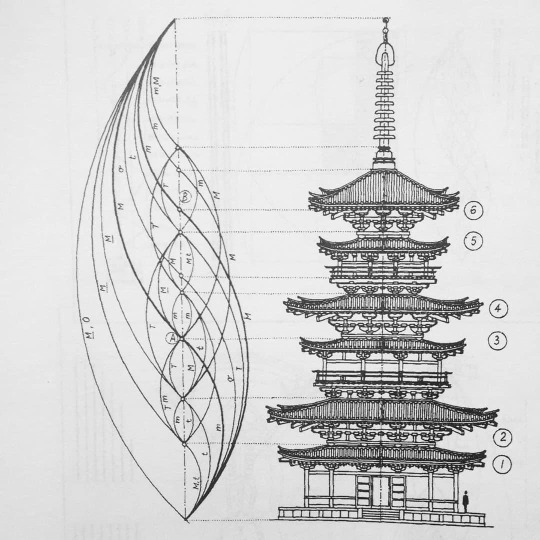
In the architecture of this 8th century Japanese Pagoda there are several relationships of the Golden Ratio (Phi). This temple was designed and built carefully so that every detail corresponds to the Golden Ratio of Nature, thus displaying a design aligned with the fractal harmony of the Universe. It is no accident that her beauty is often called "frozen music."
"The good, of course, is always beautiful, and the beautiful never lacks proportion." – Plato
✧ Yakushiji Pagoda, Japan
Image from the book "The Power of Limits: Proportional Harmonies in Nature, Art and Architecture", by György Doczi
17 notes
·
View notes
Video
Golden Jade Samurai 黄金の翡翠の侍
By Daniel Arrhakis / 大仁得 赤竜 / 丹尼尔·红龙 (2024)
With the music : Hoshun (Spring Time) : Hoshun · Yamato Ensemble
The Art of the Japanese Koto, Shakuhachi & Shamisen
youtu.be/qj_HEQ5PuCc?list=RDEM4ioJ8TkbCABipVs8At6Y4w
The "Seven Great Temples of Nara" (Nanto Shichi Daiji), which flourished before Japan's capital moved from Nara to Kyoto in 795, were Todaiji (Great Eastern Temple), Saidaiji (Great Western Temple), Yakushiji, Horyuji, Kofukuji, Gangoji and Daianji (Great Peace Temple).
At the end of the Heian period and the beginning of the Mamkura period, the Japanese people then considered the blood moon as a sign that something bad would happen.
Thirty of the best warriors were then tasked with guarding The Seven Great Temples in an oath made under the Blood Moon ... they became known as "The Red Moon Masters " or "The Great Samurais Of Nara"
(*) Images Series and Stories created by Daniel Arrhakis
(via Golden Jade Samurai 黄金の翡翠の侍 | Golden Jade Samurai 黄金の翡翠の侍 Wi… | Flickr)
0 notes
Text
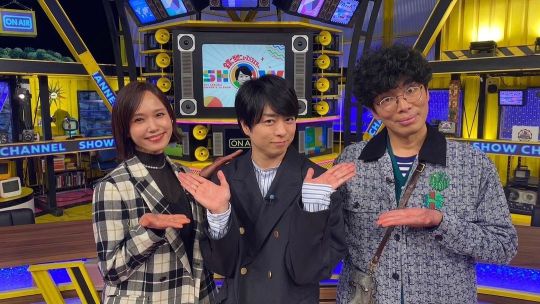
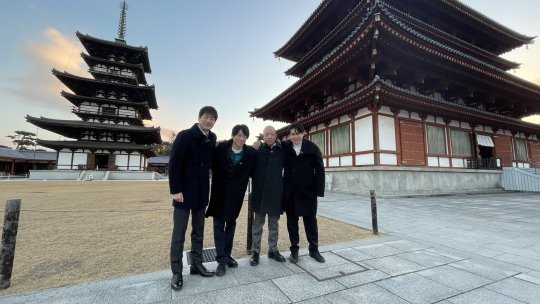
Today on the new episode of 1 Oku 3000 Mannin No SHOW Channel.
☑️Adult School field trip to Naru🦌
☑️field trip to Kanto SP ━━✨
Sakurai and Hatori, Kotoge and Yoshimura have travelled to Naru!
The show will be held at the Nara National Museum in Nara, Japan.
The director of Todaiji Shrine, who is having a bad year, is very happy to see everyone.
Praying for safety, this year is not a good year 😆.
Best Family Restaurant, Negi Event ....
Also see info on places to walk in Kanto 🚗.
Sakurai and Hatori, Kotoge and Yoshimura.A tour of Todaiji temple, Yakushiji temple and Kofukuji temple! The historical anecdotes that pop up one after another are very fascinating 🤩.
The four of them took a memorable photo in the mood of a school field trip. What did they think of when they saw the photos 🤣? Sakurai talks about the memories of the school field trip 🤗.
The programme airs on Saturdays at 21 p.m. Japan time and 13 p.m. European time. Don't miss it!
1 note
·
View note
Text

Sho-Kanzeon Bosatsu or Kannon Statue, early 8th century
Hakuho (645–710) or Asuka (538–710), Japan
Gilded bronze
188.9 cm (74.4 in)
Inside the East Hall stands a statue of Kannon (also known as Kanzeon), the bodhisattva (bosatsu) of mercy. Kannon is sometimes depicted in extraordinary forms, with 11 faces or 1,000 hands, but this statue has a simpler, more natural appearance. Hair flows over shoulders, while bodily movement, even the folds of flesh around the neck, seem almost tangible. This National Treasure is said to be one of the most beautiful Kannon statues in Japan. The “kan” in Kannon refers to a supernatural power that permits the seeing and hearing of what is normally invisible and inaudible. Kannon is often spoken of as the bodhisattva who employs this power to see and hear all beings on earth with compassion, coming to them in times of need. The Sho Kanzeon Bosatsu inside the East Hall (“Sho” meaning “sacred”) dates back to the Hakuho period (645–710) and incorporates characteristics that suggest foreign influences. For example, the thin, sari-like robe of the image reveals the contours of the legs and makes the feet and ankles clearly visible. Such details are reminiscent of Avalokitesvara images found in India. In fact, many statues at Yakushiji display a greater leaning toward Indian forms than is found at other Nara temples. No record remains of who crafted the Sacred Kannon or other statues at Yakushiji, though some believe they may have been based on artifacts brought to Nara from Buddhist realms such as India or Sri Lanka. Collection of Yakushiji Temple, Nara, Japa

#Yakushi ji#Nara#religion#art#Buddhism#bodhisattva#Japanese#bronze#gilding#gold#metal#sculpture#figure#8th century#Asuka period#Hakuho period
9 notes
·
View notes
Photo
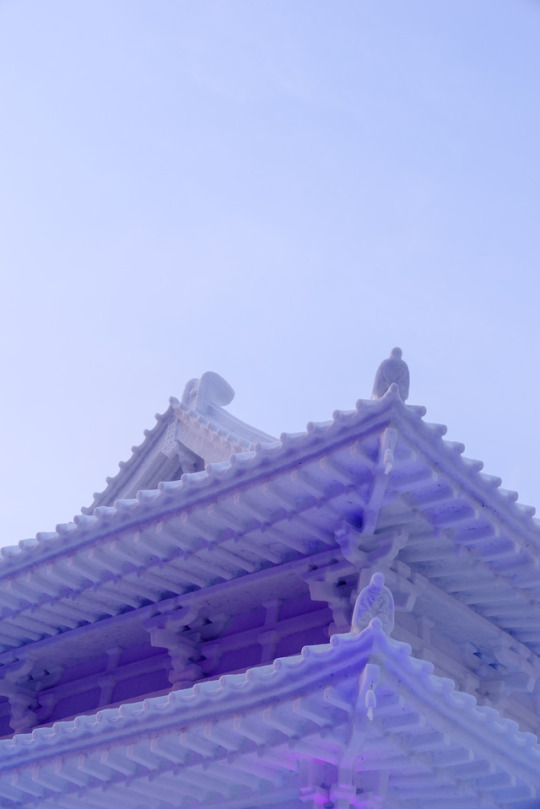
#Sapporo Snow Festival#Yakushiji temple#Sapporo#Hokkaido#札幌雪まつり#薬師寺#札幌#北海道#smc PENTAX-DA* 55mm F1.4 SDM
8 notes
·
View notes
Photo
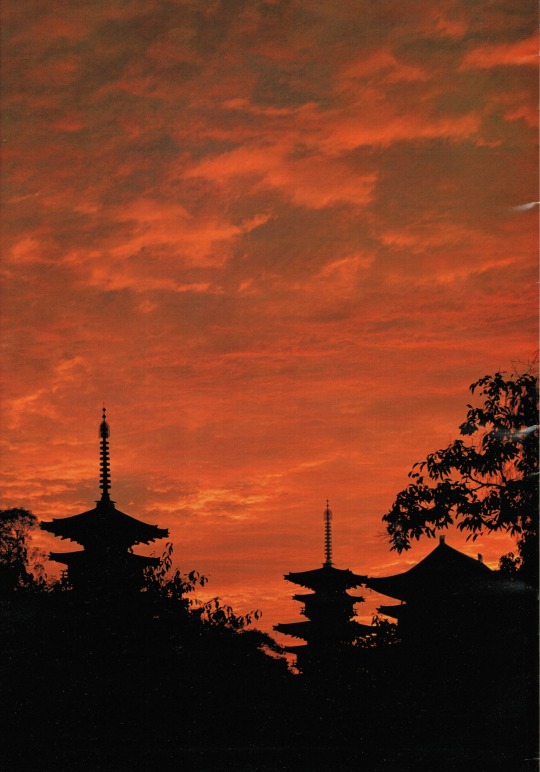
Dusk at Yakushiji Temple (薬師寺) in Nara
Image from “日本の国宝005奈良/薬師寺 (週刊朝日百科)” [National Treasures of Japan #5: Yakushiji (Weekly Asahi Encyclopedia)], published by Asahi Shimbun, 1997
90 notes
·
View notes
Photo

Yakushi-ji Temple, Nara by DanÅke Carlsson
34 notes
·
View notes
Photo

【なら奈良まつり 2021】 久しぶりに花火を楽しませて頂きました! 興福寺五重塔は来年から 120年ぶりの大規模修理工事に入るとの事で しばらく撮れないので今年はこちらから♪ ちらっと薬師寺も♡ 2021年10月3日撮影
15 notes
·
View notes
Photo
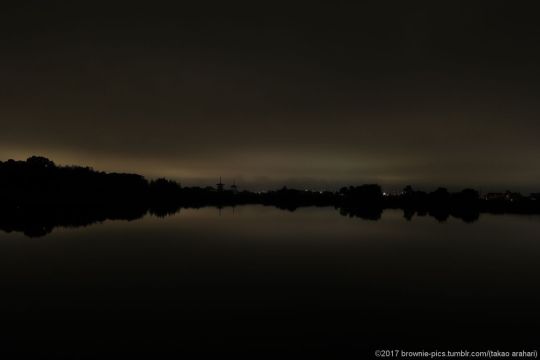
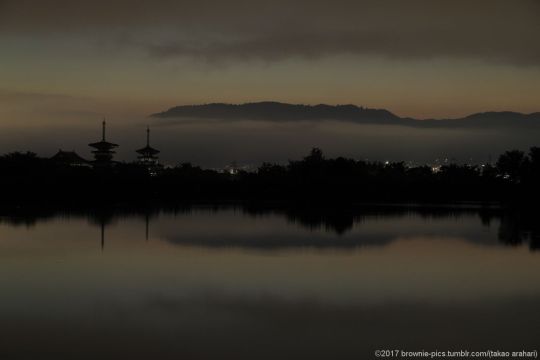
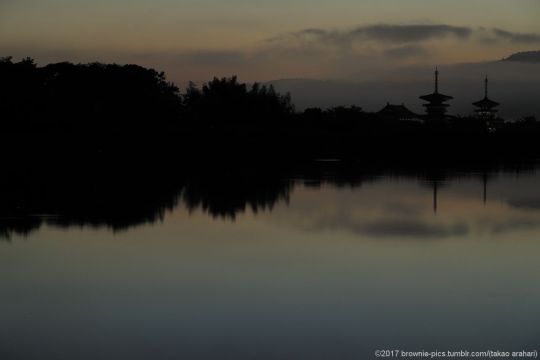
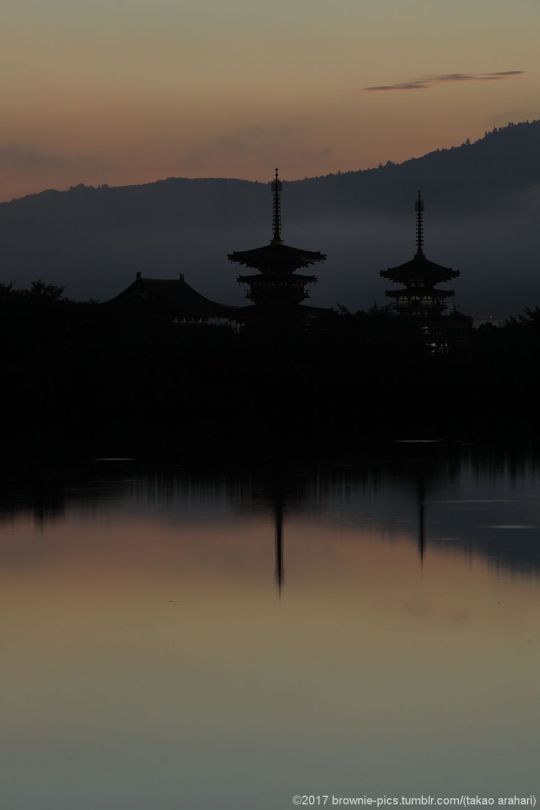
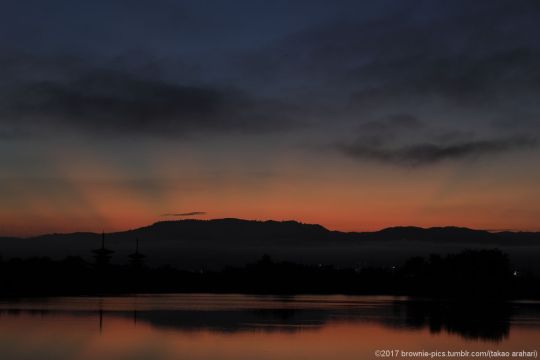

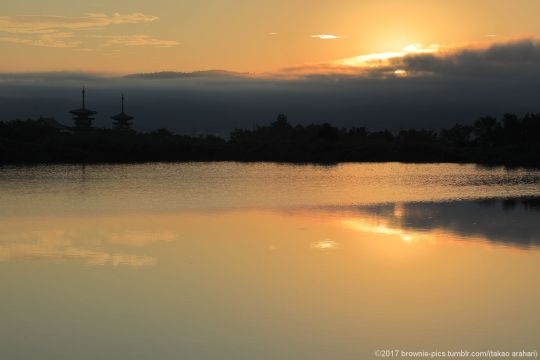

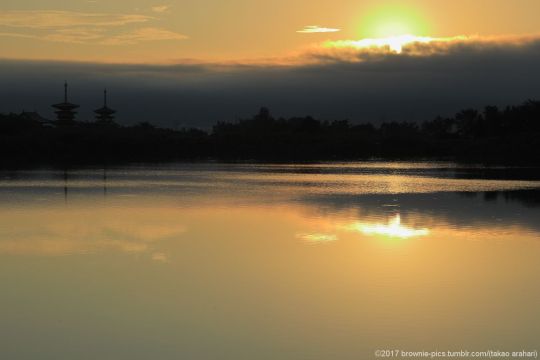
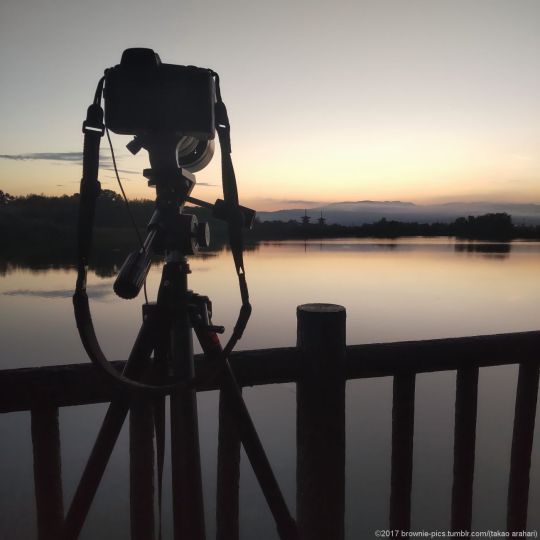
‘22.9.11 大池(西ノ京)にて
薬師寺の塔を望む、奈良写真の定番スポットへ行ってみました。ここでの絶景をずっと追いかけているカメラマンも多いです。それゆえ日の出時刻には30人ほどが池畔でカメラを据えていました。
この日は特に爆焼けやダイナミックな雲が現れた訳ではありませんが、時間とともに変わる光や空の景色は見ていて楽しいです。
#奈良#nara#日本#japan#大池#ooike pond#西ノ京#nisi-no-kyo#薬師寺#yakushiji temple#夜明け#dawn#晩夏#late summer#奈良公園じゃないシリーズ#photographers on tumblr
207 notes
·
View notes
Text




Yakushiji Temple, Nishinokyo-cho, "Nara City The "
#the apothecary diaries#kusuriya no hitorigoto#maomao#jinshi#lakan#apothecary diaries#apothecary diaries maomao#knh#apothecary diaries spoilers#knh spoilers#neo queen serenity’s posts#jinmao#jinshi x maomao#maomao x jinshi#apothecary diaries jinshi#jinshi apothecary diaries#kusuriya anime#knh maomao#knh jinshi#knh manga#knh ep 19#mao mao#tad#apothecary diaries meta
33 notes
·
View notes
Photo
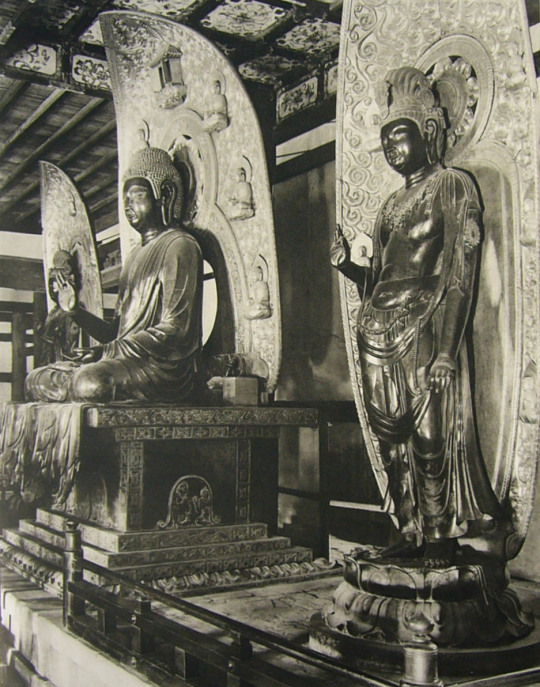
Triad of Yakushi Nyorai (Bhaisajyaguruvaidurya-tathagata)
bronze, early 8th century?
Yakushi-ji, Nara, Japan
#nara#japan#asia#art#archaeology#sculpture#yakushi#yakushiji#buddha#buddhism#buddhist#temple#religion#religious
217 notes
·
View notes
Video
youtube
Heart Sutra (cho ver.)(2020 mix.) × Ikkyu-ji Temple,Kyoto,Japan - Japane...
2 notes
·
View notes
Video
Red Copper Moon Samurai 赤銅の月侍
By Daniel Arrhakis / 大仁得 赤竜 / 丹尼尔·红龙 (2024)
With the music : Hoshun (Spring Time) : Hoshun / Hoshun (Spring Time) : Hoshun · Yamato Ensemble
The Art of the Japanese Koto, Shakuhachi & Shamisen ℗ 2015 ARC
youtu.be/qj_HEQ5PuCc?list=RDEM4ioJ8TkbCABipVs8At6Y4w
"The Samurais Of The Seven Great Temples Of Nara " (*)
The "Seven Great Temples of Nara" (Nanto Shichi Daiji), which flourished before Japan's capital moved from Nara to Kyoto in 795, were Todaiji (Great Eastern Temple), Saidaiji (Great Western Temple), Yakushiji, Horyuji, Kofukuji, Gangoji and Daianji (Great Peace Temple).
At the end of the Heian period and the beginning of the Mamkura period, the Japanese people then considered the blood moon as a sign that something bad would happen.
Thirty of the best warriors were then tasked with guarding The Seven Great Temples in an oath made under the Blood Moon ... they became known as "The Red Moon Masters " or "The Great Samurais Of Nara"
(*) Images Series and Stories created by Daniel Arrhakis
(via Red Copper Moon Samurai 赤銅の月侍 | Red Copper Moon Samurai 赤銅の月… | Flickr)
0 notes
